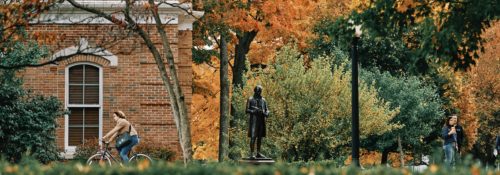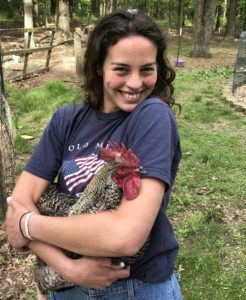
How Coming Home Should Be
Written by Emma Shea
Dr. Franklin, a beloved Hillsdale English professor, spoke indirectly to all students and alumni when he lectured at the 2021 White and Blue Weekend. In a lecture he ironically named Metaphors and The Meaning of Life, he made me step back and think for a moment on his words:
“If we attended a good college, we want to go back, and we want to go back to when our eyes were opened. We are brought forth in college from ignorance into the light of truth… not only a change in place or a change in maturity, but a change in vision. Maybe you gazed profoundly into this one equation or some aspect of God and saw it very deeply … maybe we saw into the depths of our own heart and knew ourselves for who we really were for the first time. Maybe we saw how we with all of our frailties have a place in all of history … maybe our eyes are a little blurrier now and the vision is less clear in the daily grind … so when we come back, we squint and rub our tired eyes to see things clearly again.”
After I realized how lucky I was to have written down this thought word for word, a deeper insight hit me. Why is college so transformational and life-changing? Why is this considered the beginning of the rest of our lives? As Dr. Franklin said, our eyes are literally opened from our hometowns, families, and high school friends, and shown an entirely new world of possibilities.
We can look back on our high school selves and compare them to our current selves—why are we so different? I find the main difference to be our surroundings. At Hillsdale, we are surrounded by friends of similar values, an institution of rigorous standards and morals, and responsibilities that make us grow up into independent and motivated people. Along with this, what we thought was right and true is challenged, often proven wrong and reversed, giving way to higher thought. This is how we grow up–living alongside people of differing backgrounds and pursuing truth with them.
After four or five years, we graduate, and we are torn out of this challenging environment. We alone become responsible for surrounding ourselves with new facets of intellect and challenging what we believe to be true. Most of us will move away from thought-provoking institutions like Hillsdale, or discontinue our work with academia. If we’re lucky, we will be able to hold on to the friends that challenged our preconceived notions, but these conversations occur less frequently when our everyday work is not the study of ethics or human nature.
This is why Dr. Franklin’s words resound with truth and beauty, in that his metaphor is perfectly matched with the circumstance of a Hillsdale homecoming. You are reminded of all the beautiful and complicated things you grappled to understand. You walk the campus where you and so many of your friends grew up into the men and women they were meant to be. You come back to the place that set the foundation for the rest of your life, and where you found what you wanted to pursue. It’s a nostalgic and heart-warming experience, and as a current undergraduate, I am already certain my experience will echo that of which Dr. Franklin speaks. In returning to Hillsdale after a while, remembering these perspective-altering experiences, your eyes are reminded to open up again.
Emma Shea, ’22, studies biology and religion. She is from Middleville, Michigan, but plans on somehow living in every state with National Parks and herds of sheep/ cows. When she is not running late, she is scheming up road trips with friends or how to get into events for free.
Published in August 2021
